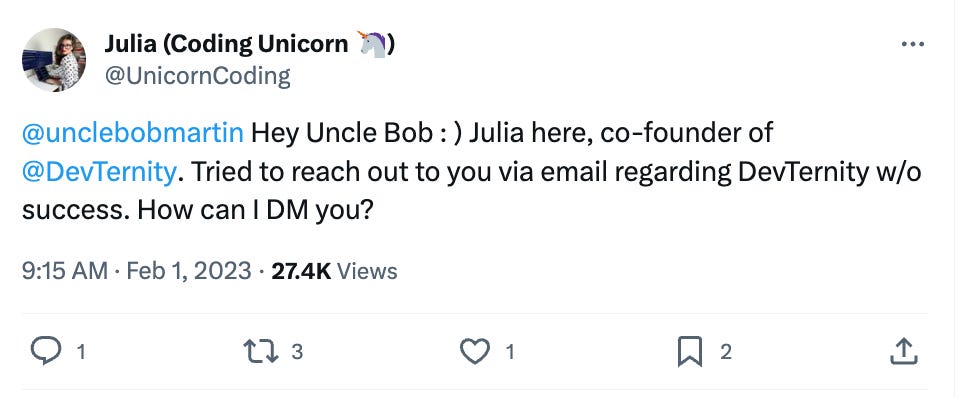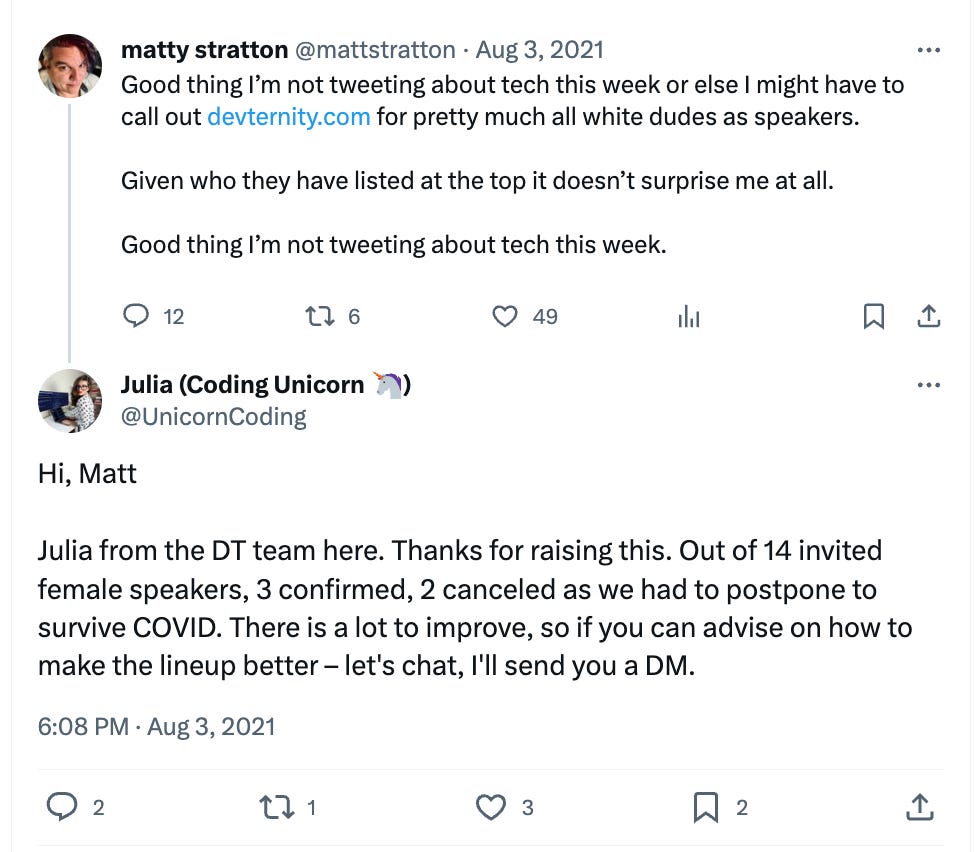A Tech Conference Listed Fake Speakers for Years: I Accidentally Noticed
For 3 years straight, the DevTernity conference listed non-existent software engineers representing Coinbase and Meta as featured speakers. When were they added and what could have the motivation been?

A year ago, I spent months doing an investigative report on how UK events tech company Pollen had its staff work for free, as it had run out of money but still kept operating. The company kept promising that missing wages would arrive – but they never did. Not only that, but the company stopped paying health insurance to US staff without informing them. The company went bankrupt, and the details I uncovered were troubling. A year later, the BBC made a documentary about the company called Crashed: $800M Festival Fail.
That BBC report required more resources than I have available. My report also created potential legal jeopardy for me – and I had to review it with lawyers before publication. I decided that while I greatly respect investigative reportage, it’s not an area I would venture into, again. And I intended to keep this promise.
However, last week I saw a post on my timeline in which a good friend of mine was announced as a speaker at the DevTernity tech conference on 7-8 December. It’s a paid, online-only conference, with tickets ranging €399-798 per person ($435-870). The speaker lineup features some of the best-known speakers in the tech industry: ones like Scott Hanselman, Kelsey Hightower, Sam Newman, David Heinemeier Hansson, Dave Farley, Allen Houb and others.
I clicked to check out what his talk will be about, and to look at the speaker lineup. Most speakers were familiar, and I also checked out the others. One profile caught my attention: Anna Boyko, a core contributor to Ethereum:

There aren’t many core Ethereum contributors, and I found it curious that someone committed to working on an open source crypto platform would join Coinbase at the same time. Eager to learn more about Anna’s professional history, I turned to LinkedIn. No matches. Google. No matches, save for this conference. I looked through the Ethereum core contributors, but found no one remotely similar. Finally, I reached out to friends at Coinbase who said they never heard of anyone called ‘Anna Boyko.’
By now, I was suspicious. Could Anna be a fake profile? Surely not for such a high-profile conference? I assumed I was missing something, and I wanted to see if this could be a one-off of inventing a fake profile to make the conference lineup look more impressive than it actually is. So I looked at other conferences by the same organizer, Dev Events. And sure enough, I found yet another non-existent speaker for JDKon 2024 called Alina Prokhoda: Senior Engineer at WhatsApp, and Microsoft MVP.

But there is no such MVP, and I confirmed with my sources that no one by this name works at Meta.
I then looked at previous DevTernity conferences. In 2022, another odd profile stood out: a speaker with no Twitter handle and a weird title; Natalie Stadler “Software Craftswoman at Coinbase:”

I don’t know about you, but I cannot imagine any Coinbase employee agreeing to such a title for a conference. Still, chatting with a contact at Coinbase, I asked them if Natalie also worked there; and she did not. But it didn’t stop here. Natalie Stadler was a listed speaker on the 2021 edition of the conference, as well.
When and why were the fake speakers added to the conferences?
You’ll notice that all the fake speakers were women. Is this a coincidence? There's a timing that questions whether this could have been an accident.
To answer, first, let's meet the conference's cofounder, Julia Kirsina (Coding Unicorn). She confirmed to hold this role in 2023:

On 3 August 2021, at 5pm GMT (6pm CEST), a complaint was made on Twitter, which message called out the all-male panel for the 2021 DevTernity lineup:

"Natalia Slater, Software Craftswoman at Coinbase" was added a few hours after this complaint on the lack of diversity was made. The DevTernity website is open source, with all changes observable, so we can find the exact commit on 3 August 2021 that added the first fake speaker. It happened at 7pm GMT (8pm CEST), so only 2 hours after the complaint made:

The same commit also added Julia Kirsina, the cofounder of the conference as a speaker: but Julia delivered no talk on this conference. Given the timing, it seems highly likely that the conference's organizers invented a woman profile to address the concerns raised by Matty Stratton.
On 6 August 2021, Natalia's name was changed to "Natalia Stadler:"

Natalie Stadler was present in the 2021 conference lineup, as well as for the 2022 one.
For the DevTernity 2023 website, Natalia Stadler was no longer part of the site when it went live on 3 January 2023. Her "colleague," Anna Boyko was added on 21 January:

The original image of Anna Boyko looked like it was generated from the website This Person Doesn't Exist. This image was updated to a perhaps more realistic one on 24 January, in a commit that updated several speaker images:

Finally, Alina Prokhoda was added to the JDKon lineup on 14 October 2023:

Is there more to this, than fake Coinbase and Meta speaker profiles?
What do you do when you find four instances of non-existent speakers at four conferences held in different years? All this took about 30 minutes of research to find out, including the pinging of contacts at Coinbase and Meta. Other people must have discovered what I did with such little effort, but it seems they said nothing. My choices seem to be to stay silent and let this deceit continue: or speak up, and hopefully help end this practice.
I decided to share that this conference advertises fake speakers, and has done so for years. This statement is easily verifiable by anyone in the same way that I did. I’ve not seen this deceit at any other tech conference, and I’ve seen enough that I didn’t want to keep quiet.
So, I publicly shared on Twitter and LinkedIn that these speakers are made up. People were obviously not happy, and asked questions.
The DevTernity conference is organized “by a small team of software engineers from Singapore, Estonia, and the Netherlands,” as per the website. One of the conference’s organizers responded in public, offering an explanation that made no sense: such as stating that this was a one-off mistake, when it’s a multi-year practice.
Further disturbing details have emerged from efforts by investigative reporters. The Verge confirmed no “Julija Kirsina” graduated from The RISEBA University of Applied Science, which is listed on this speaker’s LinkedIn profile as her professional education, and The Verge could also not reach her.
Is there even a real female software engineer behind the “Coding Unicorn” account, and does a developer with the name Julia Kirsina exist? 404Media reported that the conference’s male founder seems to be heavily involved behind Julia Kirsina’s “Coding Unicorn’s” Instagram account. Despite being listed as a featured speaker at DevTernity in 2021, 2022 and 2023, Kirsina never delivered a talk at the conference. In another relevant detail, the conference organizer was previously banned from tech social media site Lobst.ers for sockpuppeting the Coding Unicorn account.
The DevTernity conference is no longer taking place: I understand this may be because several speakers canceled after learning of the deception. I hope everyone who paid for tickets and prefers a refund gets one; for an ethically run conference, this should be a given. Hopefully, this is the last time a paid tech conference advertises invented speakers with AI-generated images who don’t actually exist.
The myth of "there are not enough women speakers"
One of the organizers of the conference responded on Twitter, claiming "There have been 1000s of events chasing the same small sub-group of female speakers." This sounds like a cheap excuse. The community response to this claim has been also strong contradiction, and people sharing resources on where women speakers can be found. A couple of these:
- Women in tech speakers and organizers: a continuously updated list on GitHub. 400+ speakers.
- STEM Ladies: a list on Twitter/X with 1,600 members
- "Reply to this thread with a woman in tech you look up to:" 300+ responses
- Guests on the Hanselminutes podcast: 920+ guests working in tech (or areas related to tech), the majority from diverse backgrounds
More coverage
We've not seen anything of this kind of deceit in tech - a conference inventing speakers, including fake images - and the mainstream media covered this first-of-a-kind unethical approach to organizing a conference, extensively:
- Male tech conference founder is behind popular woman coding influencer account (404Media)
- This dev conference organizer seems addicted to making up women (The Verge)
- Meet ‘Anna Boyko’: how a fake speaker blew up DevTernity (The New Stack)
- A popular female coding influencer's Instagram is apparently run by a man (Endgadget)
- ‘What a strange tale’: Tech conference canceled after execs flee report of fake women speakers (Fortune)
- A conference organizer lists imaginary women speakers to increase the appearance of diversity at his events (Boing Boing)
- Backlash over fake female speakers shuts down developer conference (Ars Technica)
- Tech conference accused of creating fake women speakers (Skift)
- Developer conference axed after fake female profiles outcry (Bloomberg)
- DevTernity conference collapses amid claims women speakers were faked (The Register)
- Tech conference organizer accused of using fake female panelists (Business Insider)
- Fake AI-generated woman on tech conference agenda leads Microsoft and Amazon execs to drop out (Washington Post)
A shorter version of this article was shared published in The Pragmatic Engineer Newsletter on 30 November.
Subscribe to my weekly newsletter to get articles like this in your inbox. It's a pretty good read - and the #1 tech newsletter on Substack.